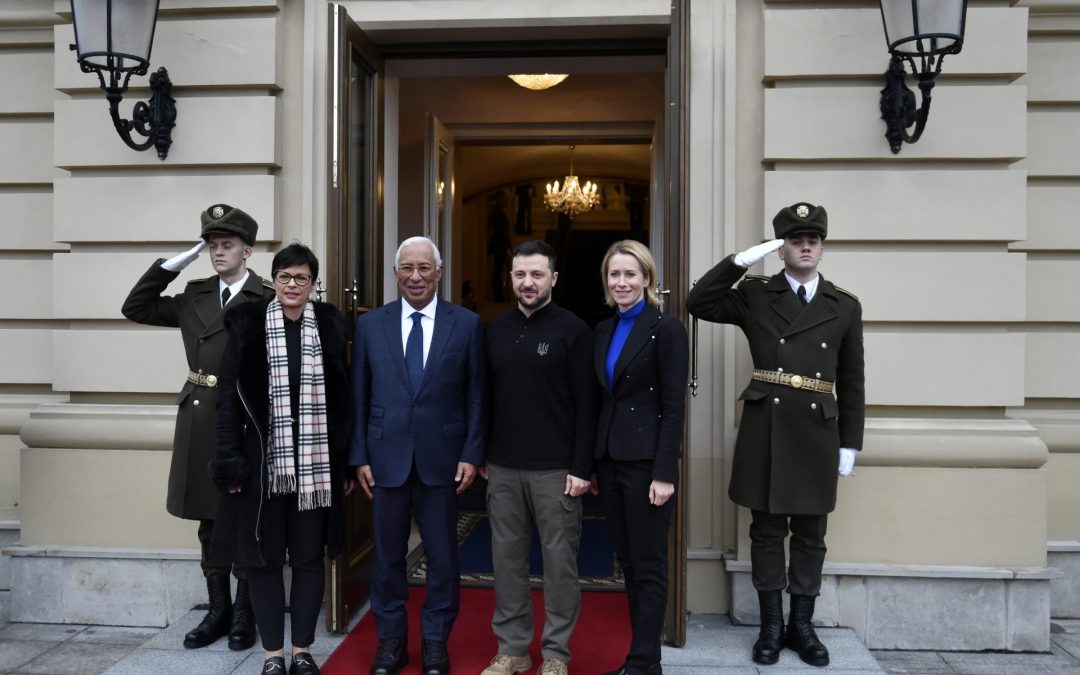The new head of European diplomacy, Kaja Kallas, and the new president of the European Council, Antonio Costa, arrived in Kyiv today for a symbolic visit to support Ukraine on the first day of their duties.
This visit comes at a time when tensions between Moscow and the West are particularly high, following Ukraine’s use of American and British-made missiles to strike deep into Russian territory and Russia’s launch of a new hypersonic missile against a Ukrainian city.
The new European Commission wishes to show its strong support for Ukraine at a time when Ukrainian forces are retreating on the frontline and the world is preparing for Donald Trump’s new term as President of the USA, which raises concerns over a possible halt in American aid to Kyiv.
“We came to send a clear message: we stand with Ukraine and continue to offer our support,” said Costa to the journalists accompanying him.
“From the first day of the war, the EU stood with Ukraine,” Costa posted on X along with a photo of himself, Kallas, and the European Commissioner for Enlargement, Marta Kos, arriving by train in Kyiv.
“From the first day of taking on our responsibilities, we reiterate our unwavering support for the Ukrainian people,” he added.
“On the first day of my duties, my message is clear: the EU wants Ukraine to win this war,” Kallas emphasized on X. “We will do whatever it takes for this.”
Beyond the difficulties it faces on the frontline, Ukraine has become the target in recent weeks of fierce aerial bombardments against its energy infrastructure, which have caused widespread power outages as winter approaches.
“The situation in Ukraine is very serious, but it is clear that it has high costs for Russia as well,” assessed Kallas, the former Prime Minister of Estonia and known advocate of maintaining a tough stance against Moscow.
Kallas and Costa, who hold the two most significant positions in the EU after the head of the European Commission, Ursula von der Leyen, are expected to hold talks with Ukrainian President Volodymyr Zelensky.
Zelensky, who for more than two years refused categorically to negotiate with Russia, seemed to soften his stance recently.
On Friday, he called for NATO to offer its protection to the areas of Ukraine controlled by Kyiv in order “to end the hot phase of the war” and implied that Kyiv would not immediately seek to reclaim the areas seized by Russia.
“If we are talking about a ceasefire, (we need) guarantees that (Russian President Vladimir) Putin will not return,” Zelensky emphasized speaking to the British television network Sky News.
On his part, Putin demands that Ukraine hands over four provinces in the southern and eastern part of the country, partially controlled by Russian troops, in addition to Crimea which Moscow annexed in 2014. He is also opposed to Ukraine joining NATO.
Kallas emphasized that “the strongest security guarantee is (Ukraine’s) accession to NATO.”
“If Ukraine decides to draw a line somewhere, how can we guarantee peace so that Putin does not go further?”, she wondered.
Diplomats in NATO estimate that there is not much chance the Alliance will offer Ukraine membership status anytime soon, given the opposition of many countries concerned that this way they will be drawn into a direct war with Russia.
According to Kallas, the EU should “exclude nothing” concerning sending European troops to Ukrainian territory to ensure respect for any agreed ceasefire, another measure that could trigger a direct conflict with Russia. “We must maintain strategic ambiguity on the issue,” Kallas emphasized.
Since the beginning of the Russian invasion in 2022, Europe has spent approximately $125 billion to support Ukraine, while the USA more than $90 billion, according to a report by the Kiel Institute.
However, the future of American support is in doubt as Trump has criticized it and has suggested that he wants the conflict to end as soon as possible.
Kallas assured that the EU would try to convince the Republican that the support of Kyiv is in the interest of the USA.
“Aid to Ukraine is not charity. A victory for Russia would undoubtedly harden China, Iran, and North Korea,” she assessed.
According to her, the EU will continue to seek to place Kyiv in a “strong” position in the event of negotiations with Russia. However, she admitted that it is becoming “increasingly difficult” for the 27-member countries to agree on new means to strengthen their support for Ukraine.
“This war has been going on for some time, and it is becoming increasingly difficult to explain it to our fellow citizens,” she pointed out, before adding: “but I see no other solution.” (01/12/2024)
EM
 go to the original language article
go to the original language article
